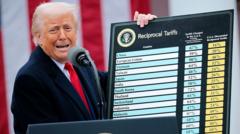As global markets react, concerns about an escalating trade war grow.
Trump Signals New Tariffs on Smartphones Amid Trade Tensions

Trump Signals New Tariffs on Smartphones Amid Trade Tensions
In a twist on trade policy, Trump hints at more tariffs on Chinese electronics, despite recent exemptions.
In a surprising development, former President Donald Trump has threatened to impose new tariffs on smartphones and other electronic devices made in China. This announcement follows a previous exemption for some electronics, which had briefly spurred a positive response in European stock markets.
Trump's assertions came alongside a call from China for the U.S. to "fully cancel" its tariffs and restore mutual respect in trade relations. U.S. officials, however, have indicated that items would instead face a new "semiconductor tariff", with further details expected soon. U.S. Commerce Secretary Howard Lutnick emphasized the necessity for critical components like semiconductors to be produced domestically, reflecting ongoing concerns over supply chain vulnerabilities.
Notably, a recent customs notice indicated that products like smartphones and computers would be excluded from the hefty 125% tariff on imports from China. However, Trump disputed this on social media, claiming that these products would simply be moved to a different category of levies. He further mentioned that upcoming investigations into the entire electronics supply chain were in progress.
In the tech industry, the implications of these tariffs are already being felt. Sony recently announced a 10% price hike on its PlayStation 5 console in several regions, citing the challenging economic climate and rising costs, although no changes were reported for the U.S. market. China's commerce ministry expressed that the U.S. exemptions represented only a minor concession, with officials evaluating their broader impact.
Despite the slight de-escalation indicated by the latest round of exemptions, the prospect of new tariffs has dampened hopes for improved relations between the two nations. U.S. Trade Representative Jamieson Greer stated that there are currently no plans for discussions between Trump and Chinese President Xi Jinping, further highlighting the standoff in trade relations.
As U.S. tariffs on Chinese imports began at 54% and escalated to 145% over recent months, China's response has been equally fierce, imposing retaliatory tariffs that have also seen dramatic increases. The Chinese government, following its latest tariff announcements, reiterated its commitment to "fight to the end" against what it considers provocation from the U.S.
While Trump's administration has maintained that tariffs are a strategic tool to achieve better trade agreements and rectify perceived imbalances, the repercussions of such policies have triggered significant fluctuations in stock markets and stoked fears of a potential decline in global trade, posing risks to jobs and economic stability.
As the situation continues to develop, Trump's forthcoming remarks on semiconductor tariffs are highly anticipated, and the ongoing trade dynamics will likely keep global markets on their toes.
Trump's assertions came alongside a call from China for the U.S. to "fully cancel" its tariffs and restore mutual respect in trade relations. U.S. officials, however, have indicated that items would instead face a new "semiconductor tariff", with further details expected soon. U.S. Commerce Secretary Howard Lutnick emphasized the necessity for critical components like semiconductors to be produced domestically, reflecting ongoing concerns over supply chain vulnerabilities.
Notably, a recent customs notice indicated that products like smartphones and computers would be excluded from the hefty 125% tariff on imports from China. However, Trump disputed this on social media, claiming that these products would simply be moved to a different category of levies. He further mentioned that upcoming investigations into the entire electronics supply chain were in progress.
In the tech industry, the implications of these tariffs are already being felt. Sony recently announced a 10% price hike on its PlayStation 5 console in several regions, citing the challenging economic climate and rising costs, although no changes were reported for the U.S. market. China's commerce ministry expressed that the U.S. exemptions represented only a minor concession, with officials evaluating their broader impact.
Despite the slight de-escalation indicated by the latest round of exemptions, the prospect of new tariffs has dampened hopes for improved relations between the two nations. U.S. Trade Representative Jamieson Greer stated that there are currently no plans for discussions between Trump and Chinese President Xi Jinping, further highlighting the standoff in trade relations.
As U.S. tariffs on Chinese imports began at 54% and escalated to 145% over recent months, China's response has been equally fierce, imposing retaliatory tariffs that have also seen dramatic increases. The Chinese government, following its latest tariff announcements, reiterated its commitment to "fight to the end" against what it considers provocation from the U.S.
While Trump's administration has maintained that tariffs are a strategic tool to achieve better trade agreements and rectify perceived imbalances, the repercussions of such policies have triggered significant fluctuations in stock markets and stoked fears of a potential decline in global trade, posing risks to jobs and economic stability.
As the situation continues to develop, Trump's forthcoming remarks on semiconductor tariffs are highly anticipated, and the ongoing trade dynamics will likely keep global markets on their toes.




















